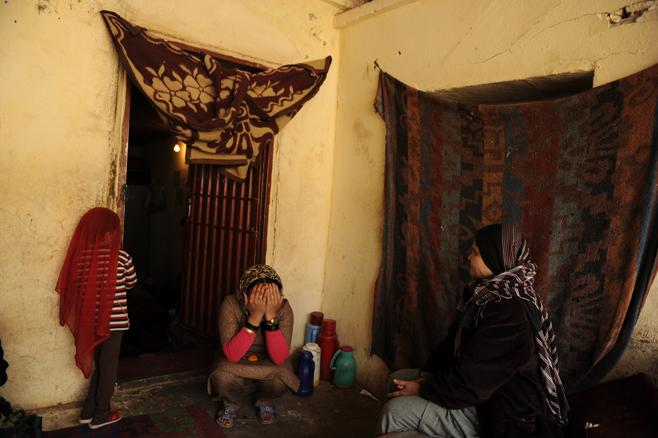
According to Human Rights Watch, for incarcerated Afghan “immoral criminal” women, moral crimes can take many shapes, including “falling in love and eloping with the lover”, “running away from an abusing husband”, “being kidnapped”, “getting lost”, “being raped”. What do all these variations share? You might think it’s the woman “victim”. You’d be wrong. For Afghans, the real victim is the woman’s family, and family means “the men of the family”.
Who then is the “typical” Afghan woman? She is the namoos, the honor and dignity of a man. This is her identity: the woman is the “other” to the man’s “self”. This dependence and otherness makes the Afghan woman oppressed and the object of man’s control over her body – her behavior, the way she walks, talks, what she wears, where she goes – because she must protect the man’s dignity and honor. His dignity and honor are embodied in her vulnerable body. A woman’s body is entrusted with the “dignity and honor” of a man. That is all there is to her being.
If the “dignity” is comprised, the woman’s body can be summarily disposed of. The woman does not even have to be at fault for this to happen. Any violations of dignity can make a woman’s body disposable. There are numerous routes to honor killing. An Afghan woman is likely to be killed by her male family members after she is thought to have compromise the “dignity and honor” of the male family members by any misconduct. Misconduct includes having been raped.
Through socialization processes at the family and community level, women internalize their “other” identity. The family produces children or youth as disciplinary subjects: “Not only the parental gaze and it’s internalization by children within the family, but also the effects of the multiple gazes originating outside the “parent-child cell” help in producing women as disciplinary subjects. Family members constantly monitor each other. For instance, like the prisoner who takes on the roles of both watcher and watched, a daughter must assume parental scrutiny even in her unobserved or private actions. Women are actively involved in the process. Their identity is tied up in observing the rules and regulations imposed on them, rules and regulations they have internalized as their own.
An Afghan woman will act upon these internalized norms and values. She will watch her body and her acts. If any rule is violated, she might punish herself. There are many instances of Afghan women who committed suicide, which can accurately be termed “honor suicide”, after being raped, to restore the honor and dignity of the family.
But what happens in those rare cases where a woman runs away rather than commit suicide? What happens when a woman who has been raped chooses to live and tell the police? The police put her in jail. If the case makes it to court, the judge sentences her to years in prison for adultery and running away. Finally, President Karzai, under pressure, might “pardon the immoral criminal so that she can marry her rapist. She will not be welcomed at her “father’s” home and she will have nowhere else to go. Either she restores the honor of the family and marries the rapist, or just she kills herself … if she hasn’t already been killed.
“Running away” is mostly associated with love, and “love” in Afghan culture is mostly an immoral word, for boy and girls. In many cases, when families have found out about a relationship, they marry their son or daughter to someone else as soon as they can, to end it.
Girls grow up being taught that men can not be trusted. Therefore, it is expected for a girl to keep herself hidden and safe until marriage. If a girl or young woman decides to run away, she knows that something is going to happen to her. If she is already on the run, she has accepted the consequences. The woman is blamed for whatever happens to her. This belief is widely shared, even among academics and students of the law. Once, in the midst of a hot debate on women’s rights, a classmate stood up and said, “I can do anything to a girl who `breaks the chains’ and steps over the line.” Many in the class, including the professor, seemed to agree, including most of the girls.
This mentality is everywhere, among ordinary people, and among academics, law students, lawyers and judges. What is taught in law school? One professor would teach us, “What goes on in a household is none of anyone else’s business. If a woman is battered or violated, nothing can be done until she goes to the police herself. If she doesn’t have any problem with it, no one can do anything”. Another would teach, “When you bring a woman to your house to `get married’, you are not just going to put her in a glass box and sit and watch.” Then he would laugh, and the class would join in. Another lecturer would teach: “ An adultery case is impossible to prove, unless four male witnesses, who were present at the scene, testify to it’s having occurred.” In other words, the women, who is the “immoral raped criminal,” has to ask the rapists and their witness accomplices to testify to having raped her.
There is no “moral crime”. “Moral crime” is the culture. For Afghan women “moral crime” is another red line drawn around them, a line that makes sure that no woman ever steps out of bounds.
(Photo Credit: Farzana Wahidy / Human Rights Watch)